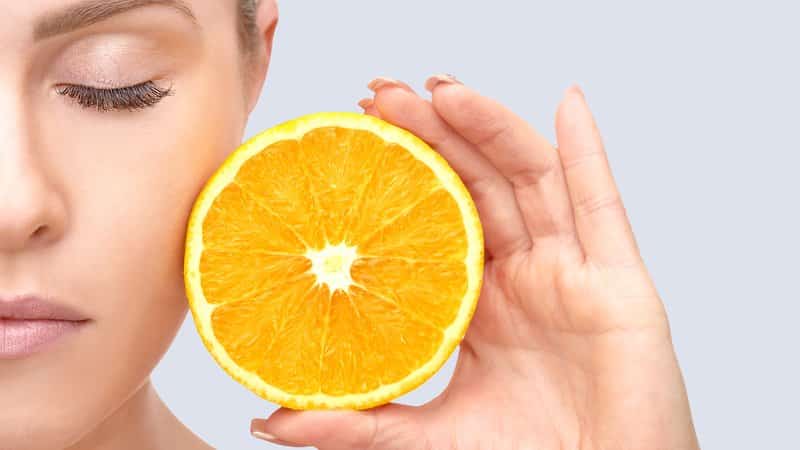Woman and oranges - benefits and harms
Orange is good for the body, especially women. It is used as part of complex therapy for the treatment of certain diseases, it is indicated during pregnancy and breastfeeding, and helps preserve beauty and youth. We will tell you in detail about the benefits and harms of oranges for women.
Chemical composition and properties of orange

Chemical composition of orange per 100 g:
- vitamins:
- A – 8 mcg;
- B1 – 0.09 mg;
- B2 – 0.04 mg;
- B5 – 0.25 mg;
- B6 – 0.06 mg;
- B9 – 30 mcg;
- C – 53.2 mg;
- E – 0.18 mg;
- N – 50 mcg;
- RR – 0.43 mg.
- macronutrients:
- potassium – 197 mg;
- calcium – 40 mg;
- magnesium – 13 mg;
- sodium – 13 mg;
- sulfur – 9 mg;
- phosphorus – 23 mg;
- chlorine – 3 mg;
- silicon – 6 mg.
- microelements:
- boron – 0.18 mg;
- iron – 0.3 mg;
- iodine – 2 mcg;
- cobalt – 1 mcg;
- manganese – 0.03 mg;
- copper – 70 mcg;
- fluorine – 17 mcg;
- zinc – 0.2 mg;
- aluminum – 157 mcg;
- vanadium – 4 mcg;
- lithium – 21 mcg;
- molybdenum – 0.88 mcg;
- nickel – 0.6 µg;
- rubidium – 27 mcg;
- selenium – 0.5 mcg;
- strontium – 8.2 mcg;
- chromium – 0.3 mcg.
The fruit also contains:
- pectin substances – 0.6 g;
- essential amino acids – 0.52 g;
- irreplaceable – 0.27 g;
- dietary fiber – 2 g.
Oranges contain tartaric, citric, folic, oxalic, and malic acids.
Orange zest is a source of natural essential oil.
Important! The chemical composition of the fruit depends on climatic conditions, growing region, variety and degree of ripeness.
Citrus is characterized by the following beneficial properties:
- has an anti-inflammatory and antipyretic effect;
- increases immunity;
- removes toxins and waste from the body;
- activates intestinal activity;
- helps fight stress and depression;
- strengthens the functioning of the cardiovascular system;
- helps with anemia;
- fights excess weight;
- lowers blood pressure;
- slows down the aging process;
- accelerates cell renewal.
Calorie content and BZHU
Calorie content of orange – 43 kcal per 100 g.
BJU per 100 g:
- proteins – 0.9 g;
- fats – 0.2 g;
- carbohydrates – 8 g.
Benefits and harms for the female body

The composition of the fruit helps keep a woman’s body healthy, but there are contraindications and periods when citrus consumption should be limited.
Medicinal properties for various diseases
Orange is used as a remedy for many diseases and conditions:
- Weakening of the immune system. In 1 tbsp. juice add 1 tsp. honey and 3 drops of essential oil. Drink the drink in the morning and evening.
- Fever. Several slices of fruit, poured with warm boiled water, are infused for 30 minutes. Drink every 2 hours.
- Cold. Grated or finely chopped whole fruit is poured with 2 tbsp. boiling water and leave for half an hour. Then filter and drink 1/4 tbsp before each meal.
- Constipation. Drink freshly squeezed orange juice with crushed pulp before bed. The juice stimulates the intestines, and the problem is solved the next morning.
- Hangover. In 1 tbsp. Add the yolk of orange juice. The mixture is drunk at one time.
- Injuries: wounds, burns. The fruit is crushed and applied topically, applying the pulp 2-3 times a day.
- Hypertension. 1 tbsp. juice mixed with 1 tbsp. l. honey and drink the mixture in 3 doses throughout the day.
- Heavy menstruation. The crushed fruit is poured with boiling water and left for 30 minutes. During the day, the infusion is drunk.
Contraindications
Orange is contraindicated for use when:
- individual intolerance;
- diabetes mellitus;
- gastritis;
- stomach and duodenal ulcers;
- digestive system disorder.
In what form and quantity to eat for maximum benefit?
The pulp, peel and white shell of citrus fruit have beneficial properties. The fruit can be eaten completely fresh. Orange juice is especially beneficial.
Excessive consumption of the fruit can lead to an allergic reaction. The daily norm is 2-3 fruits. You shouldn't eat oranges every day.
What are the benefits of oranges for women during pregnancy?

During pregnancy, a woman needs vitamins and microelements, most of which are present in citrus. Eating orange has a beneficial effect on pregnancy and fetal development.
The chemical composition and beneficial properties of the fruit help strengthen the immune system of a pregnant woman and serve as a preventative against infectious diseases.
Orange contains large quantities of folic acid, which is necessary for the full development of the fetus and is responsible for the physical and neuropsychic well-being of the baby.
Plant fiber stimulates the digestion process and relieves constipation. Vitamin C reduces the symptoms of toxicosis.
The smell of citrus has a positive effect on the emotional state of the expectant mother. Essential oils relieve emotional stress, provide vigor, and help cope with fatigue and drowsiness.
Important! Excessive eating oranges at the end of the third trimester can provoke allergies in the child.
When breastfeeding
Despite the obvious benefits of eating oranges, a nursing mother is recommended to adhere to a diet during breastfeeding and introduce oranges into the diet little by little, starting from the age of six months.
Attention! Eating oranges in large quantities during breastfeeding can cause skin rashes, diarrhea, colic and poisoning in the baby.
Recommendations for consuming oranges during breastfeeding:
- If a child has a tendency to diathesis, it is better to avoid eating oranges for the entire period of breastfeeding.
- When trying it for the first time, eat one slice, peeled from the film, and observe the child’s body’s reaction to the new product. Skin rashes may appear within 5-10 hours after feeding.
- The child’s digestion is monitored for the next two days. The absence of diarrhea and discomfort indicates that the baby’s body is coping with the assimilation of the new product.
- After the body adapts to orange, mother is allowed to eat ½ of the fruit 1-2 times a week.
What are the benefits of fruit for beauty?
In beauty care, orange is used both as a food product and as an ingredient for cosmetic procedures.
Hair

Orange reduces hair oiliness, nourishes it along its entire length, improves structure and soothes the scalp:
- the acids in the fruit smooth and nourish the hair, promote its restoration;
- vitamins C and K accelerate hair growth, make it strong and shiny, and maintain the brightness of the color of dyed hair;
- Orange juice moisturizes and strengthens hair shafts, gives strength, volume and shine.
Application of orange:
- Aroma combing. Combing with drops of oil ensures silkiness and elasticity, and gives the hair a pleasant aroma.
- Masks with pulp, zest and fruit juice. There are many recipes for masks against dandruff, for thin, dry hair, against hair loss, for strengthening hair, etc.
- Oil masks, in which orange oil is mixed with other oils. Such masks help restore hair structure.
- Adding orange oil in ready-made shampoos, balms, conditioners enhances their effect.
- Rubbing in orange oil into the hair roots for 10 minutes relaxes, expands pores and allows the skin to breathe.
Masks with orange are suitable for all hair types: dry, normal, oily, weakened.
Skin

Thanks to its natural composition, orange improves the condition and color of the skin, gives it youthfulness, and also promotes:
- skin cell regeneration;
- narrowing of enlarged pores;
- giving firmness and elasticity to the skin;
- oxygen metabolism;
- getting rid of acne, acne;
- skin whitening;
- smoothing its texture;
- production of natural collagen.
Citrus has anti-inflammatory properties, which is important for sensitive skin.
Using orange to improve skin condition:
- washing and wiping with orange juice;
- peeling with fruit acids;
- baths with citrus zest;
- skin masks with orange.
To prevent premature skin aging, it is recommended to eat one orange a day and use it in skin care.
For weight loss

Orange is actively used in the fight against excess weight. Eating oranges does not make a person gain weight. This provides dietary fiber, which replenishes hunger and improves digestion. Pectin in orange stimulates the breakdown of fats and reduces their absorption.
There are many diets with orange.Along with eating the fruit, wraps and scrubs with citrus oil are used. These procedures make the skin elastic and eliminate cellulite.
Application in cosmetology
Orange essential oil is used in skin care products of all types. It normalizes the condition of oily skin, gives it elasticity and smoothness, removes muscle tension and fights wrinkles. The oil is also used as a bleaching agent to lighten age spots. It helps eliminate toxins and softens rough skin.
Citrus extract improves cell regeneration, prevents the formation of free radicals, and protects the skin from external negative influences. It stimulates collagen production and restores skin elasticity, soothing and moisturizing it.
Orange masks are used in home cosmetology. They contain both the pulp and peel of the fruit, which have a rejuvenating, brightening and refreshing effect.
How to choose, store and use it correctly

The orange season in Russia lasts from December to March. It is recommended to choose recently picked fruits that contain the maximum amount of nutrients.
Points to pay attention to when buying an orange:
- Color. It does not affect the taste of the fruit, but it should be bright and uniform, with a smooth surface without dents or defects. Oranges with thick pores are less juicy.
- Weight. The heavier the fruit, the juicier it is.
- Size. The small fruits have a sweet and juicy taste. Excessively large oranges are most likely chemically grown.
- Aroma. The fruit should smell nice.
- If the fruit is too softIt's probably started to deteriorate.
- Hard orange unripe and sour in taste.
- Thick-barked fruits easy to peel but less sweet.
At home, at room temperature, oranges retain their properties for a week. To prolong the freshness of fruits, it is recommended to store them in the refrigerator or cool room. In such conditions they retain their quality for up to 2 months. Bright lighting and direct sunlight have a negative effect on the storage of oranges.
Optimum temperature – +2…+6°C, humidity – 85%.
Tips for eating citrus:
- Oranges should not be eaten on an empty stomach, this increases acidity and injures its walls;
- after eating citrus, it is recommended to rinse your mouth with water to avoid damage to tooth enamel;
- the fruit is not consumed with dairy products to avoid stomach upset.
This is interesting:
The benefits and harms of orange peels, rules for their preparation, storage and use.
Conclusion
Orange is a healthy fruit containing a variety of vitamins and microelements. Using citrus for food and cosmetic purposes allows a woman to remain healthy and beautiful. Orange also supports the female body during pregnancy.
It is important to follow the recommendations for eating the fruit, because it has a number of contraindications, including gastrointestinal diseases, diabetes and individual intolerance.